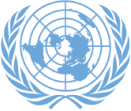Your initiative, Mr. President, to convene a thematic debate on the Millennium Development Goals (MDGs) is most timely and welcome. Guyana is pleased to contribute to the deliberations on these important issues. In doing so, my delegation associates itself fully with the statements delivered by the representative of Antigua and Barbuda on behalf of the Group of 77 and China and by the representative of Mexico on behalf of the Rio Group.
The MDGs are an important dimension of the international development agenda. They represent a key focus of global efforts to build a better world in the twenty-first century, one where people everywhere live in dignity, free from want and fear and in an environment protected from the ravages of human activity. Our debate focuses on hunger and poverty, education and health: areas where the need for progress is especially urgent. Progress in those areas is of course integrally linked with achievements in respect of other Goals, notably those related to the empowerment of women, environmental sustainability and the strengthening of the global partnership.
The theme of our present debate aptly captures our shared recognition of the fact that progress towards the achievement of the MDGs on the whole is currently off track, despite the many instances of successful interventions reported by various countries and stakeholders in this very debate and the fact that the international community has the means to address the gaps that persist. As noted in the background information for this discussion, some 143 million children under the age of 5 in the developing world continue to suffer from inadequate nutrition. In a $65‑trillion world economy, such a situation is nothing less than a call to resolute action. At the midpoint en route to 2015, our actions must be imbued with a new sense of urgency, and our partnerships with a renewed vitality, to ensure that the MDGagenda is put back on track.
Speaking from a national perspective, the Guyana MDG report for 2007, which summarizes my country’s efforts to achieve the Millennium Development Goals, reveals that progress at the national level has been modest and uneven in recent years. Guyana has attained near universal primary education, but attention to some dimensions, such as improving the percentage of trained teachers and the student-teacher ratio, continues to be necessary. The retention of trained teachers, many of whom have been lost to developed countries and other regions, is also a major challenge.
Our country is on track to achieve targets in relation to the eradication of extreme hunger, promoting gender equality and the empowerment of women and ensuring environmental sustainability. However, intensified efforts are needed to make the attainment of targets in relation to the eradication of extreme poverty and combating HIV/AIDS more likely, as well as to consolidate the encouraging gains made recently towards eliminating the threat of malaria.
On the other hand, should current trends continue, achieving the targets set for reducing child mortality, improving maternal health and combating other major diseases may prove elusive.
Thankfully, South-South cooperation, including extensive medical assistance from the Republic of Cuba, has contributed in great measure to developing Guyana’s capacity to address challenges in the health sector. We anticipate that an increase in the number of trained medical personnel, among other things, will make an appreciable difference in Guyana’s indices in the health area over the medium to long term.
The attainment of the MDGs in Guyana remains firmly anchored in our country’s poverty reduction strategy. The level of success in countering significant structural economic challenges and maintaining favourable national economic conditions overall will directly impact the prospects for attainment of the Goals by our country. At the centre of those endeavours is the need to improve agricultural production and productivity. Guyana’s experience indicates that sustained economic growth remains a necessary, if not sufficient, condition to ensure progress towards the MDGs. Indeed, a number of further lessons can be drawn from the MDG experience that bear mention in our debate.
First, significant progress is possible with the scaling up of assistance and efforts. As a country participating in the Heavily Indebted Poor Countries Debt Initiative, Guyana has benefited from significant multilateral and bilateral debt relief. The substantial decline in debt servicing has afforded us the opportunity to channel increasingly more of our resources towards poverty reduction. The higher level of investment in the social sectors has provided the basis for the more positive trends in achievement that we have begun to see recently. The programme on the prevention of mother-to-child transmission, which is facilitated with assistance from the United States through the President’s Emergency Plan for AIDS Relief, provides a good example of the impact of scaled-up external assistance. Before the initiation of that programme in Guyana, in 2001, 35 per cent of children born to infected mothers were also born with the HIV/AIDS virus. By 2005, in areas where the programme was accessible, the percentage had dropped to an average of 5 per cent.
Secondly, the extent of progress is currently circumscribed mainly by the lack of resources, and by issues of sustainability where previous assistance had been received. There have been notable shortfalls in donor pledges and disbursement of financial resources to implement our poverty reduction strategy. For instance, from 2003 to 2006, Guyana received just one fifth of the amount pledged — and needed — for support to achieve the MDGs. Important resource gaps have been identified. The additional resources that are required are beyond the capacity of Guyana’s current macroeconomic programme. The gap between resource commitments and disbursements therefore needs to be closed as a matter of urgency.
A third lesson is that a holistic approach remains the best guarantee for the successful achievement of the MDGs, given the interrelated nature of the challenges to be addressed. One of the more formidable of Guyana’s challenges in meeting the MDGs is the problem of reducing the incidence of communicable diseases. It was widely accepted that our country had overcome the challenge posed by tuberculosis many years ago. However, with the emergence of the HIV/AIDS epidemic, the incidence of tuberculosis has resurfaced, to the extent that it is now recognized as a foremost public health challenge. In this instance, treating tuberculosis effectively is intricately linked to effectively addressing the challenge posed by HIV/AIDS, which of course is also closely linked with progress in other socio-economic areas.
Going forward, Guyana’s critical challenges include addressing impediments to economic growth, including the maintenance of debt sustainability, strengthening agricultural production and productivity, addressing capacity-building needs and obstacles to resource absorption, optimizing the resource envelope, coping with rapidly rising prices for basic food items and energy, improving monitoring and evaluation methods, addressing competing priorities such as those occasioned by climate change, dealing with crime and security and exogenous shocks, mainstreaming gender issues and developing a national strategy for achieving the MDGs in Guyana.
The challenge from climate change is particularly real for a country like ours, which on the coasts is below sea level and subject to extensive flooding and which suffered a loss of nearly 60 per cent of its gross domestic product as a result of the last major inundation, in 2005. Care has to be taken to ensure that meeting the real challenge posed by climate change does not exacerbate the competition for resources to be devoted to the MDG challenge.
In conclusion, my delegation wishes to underscore the fact that many gaps persist in the global effort to ensure the achievement of the MDGs by 2015. One is the relatively limited attention accorded to agriculture and food security. As the World Bank has noted, about 70 per cent of the MDG target group live in rural areas, particularly in Asia and Africa. For most of the rural poor, including in countries such as my own, agriculture is a crucial component in the successful attainment of the MDGs. Increased global investment in agriculture and food security is therefore essential to the success of the MDGagenda.


